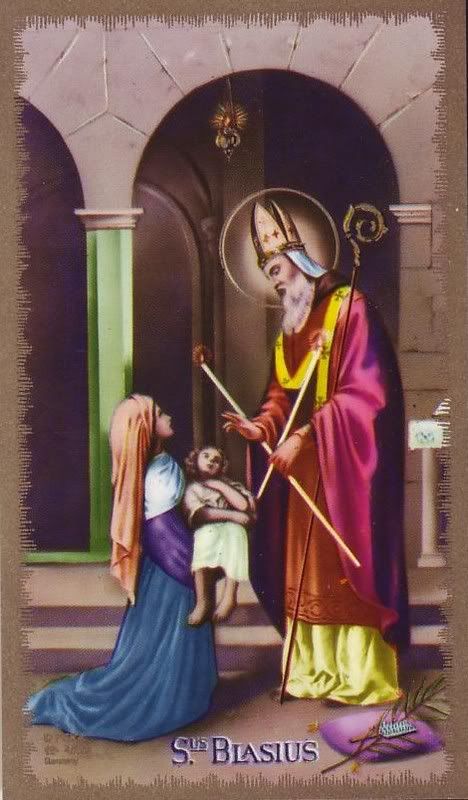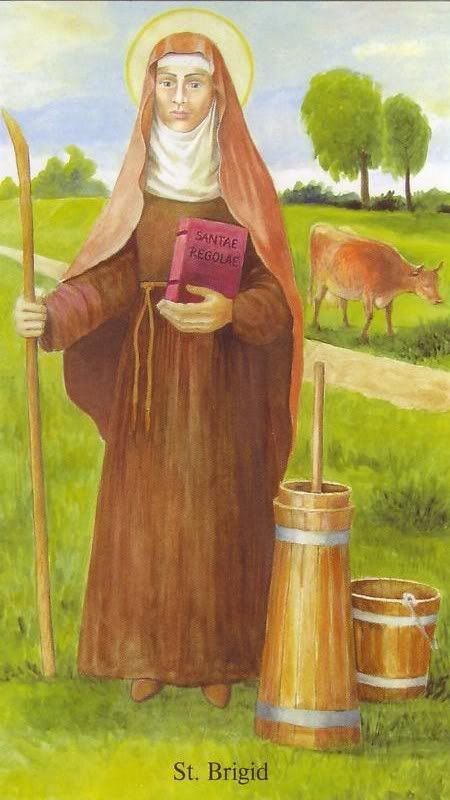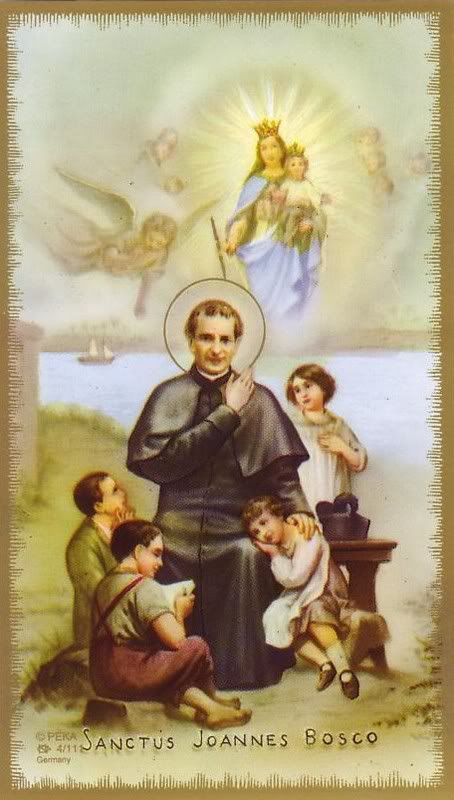Saturday, February 04, 2012
Our Blessed Lady's Saturday

MY Queen! My Mother! I give myself entirely to thee, and, to show my devotion to thee, I consecrate to thee my eyes, my ears, my mouth, my heart, my entire self. Wherefore, O loving Mother, as I am thine own, keep me, defend me, as thy property and possession. Amen.
Labels: Our Blessed Lady
The Deposito Of the Alleluia
The season of Septuagesima begins with Vespers this evening.
We do not now deserve
To sing the Alleluia forever;
Guilt forces us
To dismiss you, O Alleluia.
For the time approaches in which
We must weep for our sins.
From Father Francis X. Weiser, S.J. (former pastor of Holy Trinity, Boston), Handbook of Christian Feasts and Customs:
The depositio (discontinuance) of the Alleluia on the eve of Septuagesima assumed in medieval times a solemn and emotional note of saying farewell to the beloved song. Despite the fact that Pope Alexander II had ordered a very simple and somber way of "deposing" the Alleluia, a variety of farewell customs prevailed in many countries up to the sixteenth century. They were inspired by the sentiment that Bishop William Duranti (1296) voiced in his commentaries on the Divine Office: "We part from the Alleluia as from a beloved friend, whom we embrace many times and kiss on the mouth, head and hand, before we leave him."
The liturgical office on the eve of Septuagesima was performed in many churches with special solemnity, and alleluias were freely inserted in the sacred text, even to the number of twenty-eight final alleluias in the church of Auxerre in France. This custom also inspired some tender poems that were sung or recited during Vespers in honor of the sacred word. The best known of these hymns is, Alleluia, dulce carmen ("Alleluia, Song of Gladness"), composed by an unknown author of the tenth century. It was translated into English by John Mason Neale (1866) and may be found in the official hymnal of the Protestant Episcopal Church.
In some French churches the custom developed in ancient times of allowing the congregation to take part in the celebration of a quasi-liturgical farewell ceremony. The clergy abstained from any role in this popular service. Choirboys officiated in their stead at what was called "Burial of the Alleluia" performed the Saturday afternoon before Septuagesima Sunday. We find a description of it in the fifteenth-century statute book of the church of Toul:
"On Saturday before Septuagesima Sunday all choir boys gather in the sacristy during the prayer of the None, to prepare for the burial of the Alleluia. After the last Benedicamus [i.e., at the end of the service] they march in procession, with crosses, tapers, holy water and censers; and they carry a coffin, as in a funeral. Thus they proceed through the aisle, moaning and mourning, until they reach the cloister. There they bury the coffin; they sprinkle it with holy water and incense it; whereupon they return to the sacristy by the same way."
In Paris, a straw figure bearing in golden letters the inscription "Alleluia" was carried out of the choir at the end of the service and burned in the church yard.
With the exception of these quaint aberrations, however, the farewell to alleluia in most countries was an appropriate addition to the official ceremonies of the liturgy. The special texts (hymns, responsories, antiphons) used on that occasion were taken mostly from Holy Scripture, and are filled with pious sentiments of devotion....
Thus the Alleluia is sung for the last time and not heard again until it suddenly bursts into glory during the Mass of the Easter Vigil when the celebrant intones this sacred word after the Epistle, repeating it three times, as a jubilant herald of the Resurrection of Christ.
1. Alleluia dulce carmen,
Vox perennis gaudii,
Alleluia laus suavis
Est choris coelestibus,
Quam canunt Dei manentes
In domo per saecula.
2. Alleluia laeta mater
Concivis Jerusalem:
Alleluia vox tuorum
Civium gaudentium:
Exsules nos flere cogunt
Babylonis flumina.
3. Alleluia non meremur
In perenne psallere;
Alleluia vo reatus
Cogit intermittere;
Tempus instat quo peracta
Lugeamus crimina.
4. Unde laudando precamur
Te beata Trinitas,
Ut tuum nobis videre
Pascha des in aethere,
Quo tibi laeti canamus
Alleluia perpetim.
We do not now deserve
To sing the Alleluia forever;
Guilt forces us
To dismiss you, O Alleluia.
For the time approaches in which
We must weep for our sins.
From Father Francis X. Weiser, S.J. (former pastor of Holy Trinity, Boston), Handbook of Christian Feasts and Customs:
The depositio (discontinuance) of the Alleluia on the eve of Septuagesima assumed in medieval times a solemn and emotional note of saying farewell to the beloved song. Despite the fact that Pope Alexander II had ordered a very simple and somber way of "deposing" the Alleluia, a variety of farewell customs prevailed in many countries up to the sixteenth century. They were inspired by the sentiment that Bishop William Duranti (1296) voiced in his commentaries on the Divine Office: "We part from the Alleluia as from a beloved friend, whom we embrace many times and kiss on the mouth, head and hand, before we leave him."
The liturgical office on the eve of Septuagesima was performed in many churches with special solemnity, and alleluias were freely inserted in the sacred text, even to the number of twenty-eight final alleluias in the church of Auxerre in France. This custom also inspired some tender poems that were sung or recited during Vespers in honor of the sacred word. The best known of these hymns is, Alleluia, dulce carmen ("Alleluia, Song of Gladness"), composed by an unknown author of the tenth century. It was translated into English by John Mason Neale (1866) and may be found in the official hymnal of the Protestant Episcopal Church.
In some French churches the custom developed in ancient times of allowing the congregation to take part in the celebration of a quasi-liturgical farewell ceremony. The clergy abstained from any role in this popular service. Choirboys officiated in their stead at what was called "Burial of the Alleluia" performed the Saturday afternoon before Septuagesima Sunday. We find a description of it in the fifteenth-century statute book of the church of Toul:
"On Saturday before Septuagesima Sunday all choir boys gather in the sacristy during the prayer of the None, to prepare for the burial of the Alleluia. After the last Benedicamus [i.e., at the end of the service] they march in procession, with crosses, tapers, holy water and censers; and they carry a coffin, as in a funeral. Thus they proceed through the aisle, moaning and mourning, until they reach the cloister. There they bury the coffin; they sprinkle it with holy water and incense it; whereupon they return to the sacristy by the same way."
In Paris, a straw figure bearing in golden letters the inscription "Alleluia" was carried out of the choir at the end of the service and burned in the church yard.
With the exception of these quaint aberrations, however, the farewell to alleluia in most countries was an appropriate addition to the official ceremonies of the liturgy. The special texts (hymns, responsories, antiphons) used on that occasion were taken mostly from Holy Scripture, and are filled with pious sentiments of devotion....
Thus the Alleluia is sung for the last time and not heard again until it suddenly bursts into glory during the Mass of the Easter Vigil when the celebrant intones this sacred word after the Epistle, repeating it three times, as a jubilant herald of the Resurrection of Christ.
1. Alleluia dulce carmen,
Vox perennis gaudii,
Alleluia laus suavis
Est choris coelestibus,
Quam canunt Dei manentes
In domo per saecula.
2. Alleluia laeta mater
Concivis Jerusalem:
Alleluia vox tuorum
Civium gaudentium:
Exsules nos flere cogunt
Babylonis flumina.
3. Alleluia non meremur
In perenne psallere;
Alleluia vo reatus
Cogit intermittere;
Tempus instat quo peracta
Lugeamus crimina.
4. Unde laudando precamur
Te beata Trinitas,
Ut tuum nobis videre
Pascha des in aethere,
Quo tibi laeti canamus
Alleluia perpetim.
Labels: Septuagesima
Friday, February 03, 2012
Friday At the Foot Of the Cross

Prayer by Saint Alphonsus de Liguori:
Lord! enlighten me, that I may feel the injustice which I have done Thee, and the eternal chastisements I have deserved, by offending Thee. My God! I feel a great remorse for having offended Thee; but this pain consoles me. Hadst Thou sent me to hell, as I deserved, the thought of the trifle for which I was damned should be the hell of my hell. But now this remorse, I say, consoles me; because it encourages me to hope for pardon from Thee, who hast promised to pardon all who repent. Yes, my Lord! I repent of having outraged Thee. I embrace this sweet pain of remorse. I even entreat Thee to increase it, and to preserve it in my heart till death, that I may always weep bitterly over the offences I have offered to Thee. My Jesus! pardon me. O my Redeemer! who, to procure mercy for me, hadst not mercy on Thyself, but condemnedst Thyself to die through pain in order to deliver me from hell, have mercy on me. Grant that my remorse for having offended Thee may keep me always sorrowful, and, at the same time, inflame my whole soul with love for Thee, who hast loved me so tenderly, who hast borne with me so patiently, and who now, instead of chastising me, enrichest me with Thy lights and graces. I thank Thee, O my Jesus! and I love Thee. I love Thee more than myself. I love Thee with my whole heart. Thou knowest not how to despise a soul that loves Thee. I love Thee. Do not banish me from Thy face. Receive me, then, into Thy friendship, and do not permit me ever more to lose Thee. Mary, my Mother! accept me for thy servant, and bind me to Jesus, thy Son. Ask him to pardon me, to give me his love and the grace of perseverance till death.
Labels: Friday At the Foot Of the Cross
Saint Blaise

Here is what The Golden Legend has to say about St. Blaise, whose patronage is particularly efficacious for those suffering from disorders of the throat.
St. Blaise, please pray for us!
Labels: Our Saintly Brethern
Thursday, February 02, 2012
Candlemas Day 2012
Candlemas Day
by Robert Herrick
Kindle the Christmas brand, and then
Till sunset let it burn;
Which quench'd then lay it up again
Till Christmas next return.
Part must be kept wherewith to tend
The Christmas log next year;
And where 'tis safely kept, the fiend
Can do no mischief there.
This poem describes the custom of taking down the last of the Christmas holly on Candlemas, and burning it. It should certainly be dry enough by now.
However, an alternate custom was to reserve the last of the holly and use it as kindling for the fire for the Shrove Tuesday pancakes. This year, that would mean keeping the dried-out holly around almost another 3 weeks.
This is the feast of the Purification of the Virgin, which, under Jewish Law comes 40 days after childbirth. And Candlemas is 40 days after Christmas. The Church also (rather oddly, I think) adds the Feast of the Presentation. Odd, because under Jewish Law, the baby Jesus would have been presented and circumcised on the eighth day after his birth, or the Octave of Christmas. So, there were two Temple-related events after the Nativity, the Presentation on January 1st, and the Purification or Churching of Mary, on February 2nd. The Holy Family must have remained in Bethlehem (though they probably moved out of the stable, as the Magi story speaks of a "house") to be close to Jerusalem and the Temple for these two events. It can only be after this that the Flight to Egypt and the Slaughter of the Holy Innocents took place.
How did Candlemas get its name? Today was the day to bring to church for blessing the year's supply of candles, especially candles with a semi-sacramental nature, like the candles placed in the window on Christmas Eve, Christmas Day, New Years, and Epiphany in Irish homes, candles for the Advent wreath, candles for the home sick visit kit, or candles used in home shrines.
One of the European superstitions connected with Candlemas was that a fair, clear Candlemas meant a longer winter, where a cloudy Candlemas would mean the end of winter was at hand. In Europe, the end of February is often quite spring-like, where here in the US (especially here in New England), it tends to be more wintery, as our seasons run about 3 weeks behind the European seasons.
Here is a German saying:
When it storms and snows on Candlemas Day,
Spring is not far away;
if it's bright and clear,
Spring is not yet near.
This gave rise to the legend that if the groundhog sees his shadow on February 2nd (now better known as Groundhog Day) it means 6 more weeks of winter (as opposed to only 4 more weeks if he does not see it).
Check out our friends at Fish Eaters for more on Candlemas customs.
Also, see The Golden Legend on the Purification of Our Blessed Lady.
by Robert Herrick
Kindle the Christmas brand, and then
Till sunset let it burn;
Which quench'd then lay it up again
Till Christmas next return.
Part must be kept wherewith to tend
The Christmas log next year;
And where 'tis safely kept, the fiend
Can do no mischief there.
This poem describes the custom of taking down the last of the Christmas holly on Candlemas, and burning it. It should certainly be dry enough by now.
However, an alternate custom was to reserve the last of the holly and use it as kindling for the fire for the Shrove Tuesday pancakes. This year, that would mean keeping the dried-out holly around almost another 3 weeks.
This is the feast of the Purification of the Virgin, which, under Jewish Law comes 40 days after childbirth. And Candlemas is 40 days after Christmas. The Church also (rather oddly, I think) adds the Feast of the Presentation. Odd, because under Jewish Law, the baby Jesus would have been presented and circumcised on the eighth day after his birth, or the Octave of Christmas. So, there were two Temple-related events after the Nativity, the Presentation on January 1st, and the Purification or Churching of Mary, on February 2nd. The Holy Family must have remained in Bethlehem (though they probably moved out of the stable, as the Magi story speaks of a "house") to be close to Jerusalem and the Temple for these two events. It can only be after this that the Flight to Egypt and the Slaughter of the Holy Innocents took place.
How did Candlemas get its name? Today was the day to bring to church for blessing the year's supply of candles, especially candles with a semi-sacramental nature, like the candles placed in the window on Christmas Eve, Christmas Day, New Years, and Epiphany in Irish homes, candles for the Advent wreath, candles for the home sick visit kit, or candles used in home shrines.
One of the European superstitions connected with Candlemas was that a fair, clear Candlemas meant a longer winter, where a cloudy Candlemas would mean the end of winter was at hand. In Europe, the end of February is often quite spring-like, where here in the US (especially here in New England), it tends to be more wintery, as our seasons run about 3 weeks behind the European seasons.
Here is a German saying:
When it storms and snows on Candlemas Day,
Spring is not far away;
if it's bright and clear,
Spring is not yet near.
This gave rise to the legend that if the groundhog sees his shadow on February 2nd (now better known as Groundhog Day) it means 6 more weeks of winter (as opposed to only 4 more weeks if he does not see it).
Check out our friends at Fish Eaters for more on Candlemas customs.
Also, see The Golden Legend on the Purification of Our Blessed Lady.
Labels: Annual Cycles
Wednesday, February 01, 2012
Saint Brigid Of Kildare

Here is a website on the beloved patroness of Ireland.
Included on a page, are 3 different methods for making a St. Brigid's Cross. I notice that the website has been moved since the last year, and the link for the directions on how to make the cross are now either not working accidentally, or deliberately omitted to get people to buy a book with the directions. I always wanted to try making this type of cross, but I doubt my skills at that sort of thing are equal to the task.

Interestingly. on another page of the site (scroll down, but take the time to peruse the entire page of seasonal customs, much of the information derived from the excellent The Year In Ireland by Kevin Danaher), there is yet another Luck Visit custom associated with St. Brigid's Eve.
In my various researches, I have come across numerous luck visit rituals (mostly) from the British Isles, and mostly associated with what we now call "the holidays," the period from Halloween through Candlemas. To jog the memory, I have discussed here Soulling, Trick-or-Treat, A Penny For the Guy, Something For Thanksgiving (apparently entirely American, though derived from British precedents), wassailling, carolling, John Canoe (again American, and particular to the slave population on Southern plantations), and the Plough Monday Ritual and play.
Irish folk used to go about with an effigy of Saint Brigid dressed in white, and offer this song in exchange for a gift of food, drink, or coin:
Something for poor Biddy!
Her clothes are torn
Her shoes are worn
Something for poor Biddy!
or
Here is Brigid dressed in white,
Give her a penny for her night
She is deaf, she is dumb
She cannot talk without a tongue.
or
Here comes Brigid dressed in white
Give her something for the night
She is deaf, she is dumb
For Gods sake give her some.
Note that among the Celts, and in Europe generally, February 1st is considered the beginning of Spring, where here in the Northeastern US, it is very much a cold, snowy winter month, with the first real hope for nice weather at least 6 weeks off, often longer.
But take heart! St. Brigid is our patroness, and her feast this year falls squarely during Carnival. So we can celebrate our Irishness with our patroness today!
Labels: Our Saintly Brethern
Tuesday, January 31, 2012
Saint John Bosco

Read here Catholic Tradition's page on this saint.
Saint John Bosco, please pray for us!
Labels: Our Saintly Brethern
Sunday, January 29, 2012
If Today Were Not A Sunday
It would be liturgically observed as the feast of a Doctor of the Church, Saint Francis de Sales!

Here is a brief biography of this great saint of the Counter Reformation and Doctor of the Church.
His An Introduction To the Devout Life, which I read for the first time last year, is a Catholic classic. Here it is in e-text.
You don't really need that St. John's Wort.
Saint Francis de Sales, please pray for us!

Here is a brief biography of this great saint of the Counter Reformation and Doctor of the Church.
His An Introduction To the Devout Life, which I read for the first time last year, is a Catholic classic. Here it is in e-text.
You don't really need that St. John's Wort.
One of the principle effects of holy abandonment in God is evenness of spirits in the various accidents of this life, which is certainly a point of great perfection, and very pleasing to God. The way to maintain it is in imitation of the pilots, to look continually at the Pole Star, that is, the Divine Will, in order to be constantly in conformity with it. For it is this will which, with infinite wisdom rightly distributes prosperity and adversity, health and sickness, riches and poverty, honor and contempt, knowledge and ignorance, and all that happens in this life. On the other hand, if we regard creatures without this relation to God, we cannot prevent our feelings and disposition from changing, according to the variety of accidents which occur.
Saint Francis de Sales, please pray for us!
Labels: Our Saintly Brethern






































































































